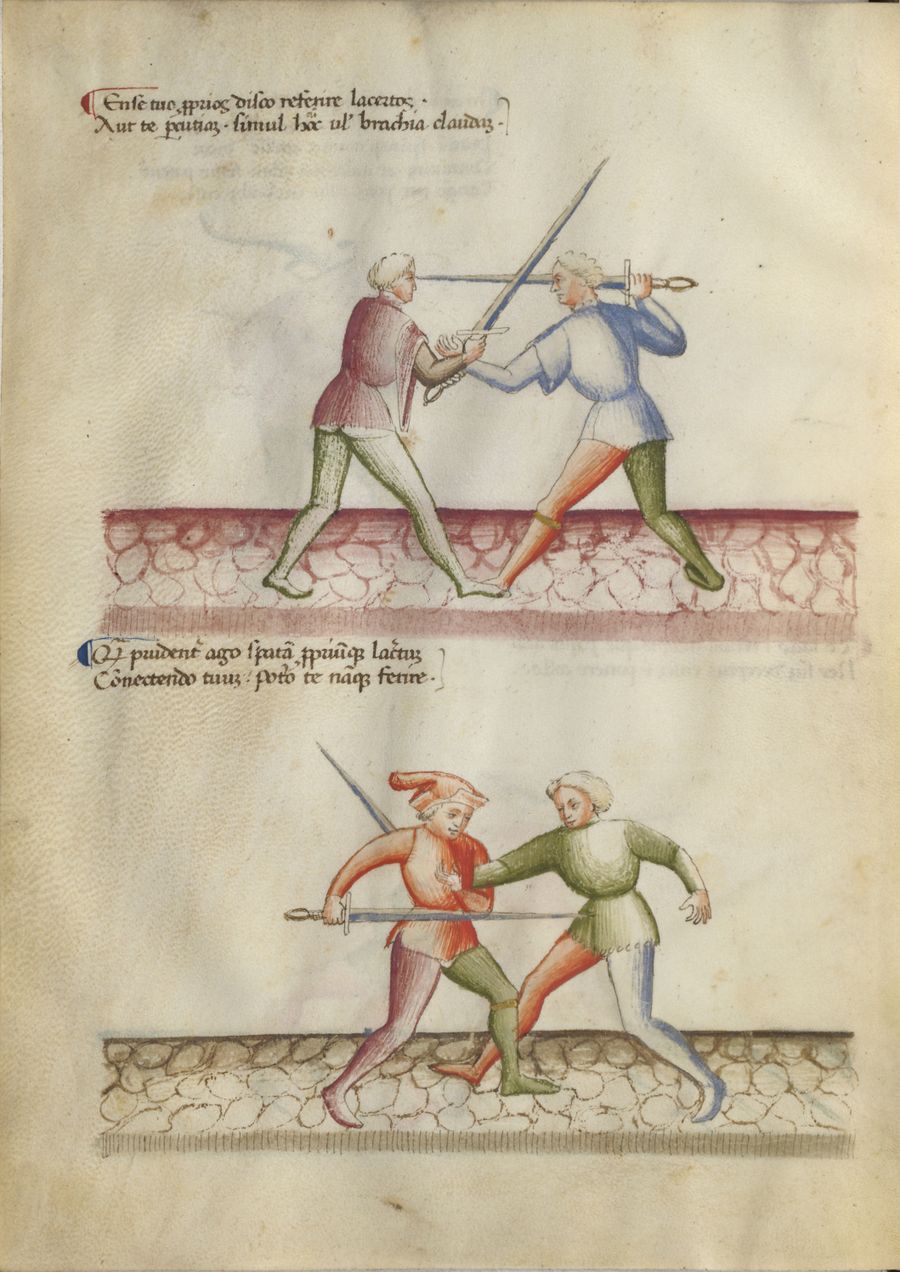|
|
You are not currently logged in. Are you accessing the unsecure (http) portal? Click here to switch to the secure portal. |
Difference between revisions of "User:Kendra Brown/Florius/English MS Latin 11269 27v"
| (16 intermediate revisions by 2 users not shown) | |||
| Line 8: | Line 8: | ||
|- style="vertical-align: top;" | |- style="vertical-align: top;" | ||
| style="width: 30em;" | | | style="width: 30em;" | | ||
| − | This play is taken from the | + | This play is taken from the play of the dagger—namely, from the first remedy master, who puts his left hand under the dagger so as to take it from the hand; similarly, this scholar puts his left hand under the right hand of the player so as to take his sword from his hand. |
| + | |||
| + | Otherwise, he will put him in a middle bind as in the second play that is after the first remedy master of dagger that was mentioned before. And that bind is this scholar's. | ||
| style="width: 30em;" | {{section|Page:MS Ludwig XV 13 29v.jpg|29v-b}} | | style="width: 30em;" | {{section|Page:MS Ludwig XV 13 29v.jpg|29v-b}} | ||
|} | |} | ||
| Line 15: | Line 17: | ||
</noinclude> | </noinclude> | ||
<poem> | <poem> | ||
| − | {{par|r}} I learn to strike | + | ✅{{par|r}} I learn to strike back [your] own shoulders by means of your sword. |
| − | + | Or I would beat you. Simultaneously with this [strike], I would also confine your forearms. | |
| − | {{par|b}} | + | ✅{{par|b}} I act so prudently by enfolding the sword [spatam] and indeed your arm. |
| + | In fact, I will be able to strike you. | ||
</poem> | </poem> | ||
<noinclude>[[file:MS Latin 11269 27v.jpg|900px]]</noinclude> | <noinclude>[[file:MS Latin 11269 27v.jpg|900px]]</noinclude> | ||
Latest revision as of 19:09, 12 August 2025
Latin 27v
¶ Ense tuo proprios disco referire lacertos.
Aut te percutiam. simul hoc[1] vel brachia claudam.[2]
¶ Quam prudenter ago spatam propriumque lacertum
Connectendo tuum. potero te namque ferire.
Italian
Not in PD, only Paris and Getty.
|
This play is taken from the play of the dagger—namely, from the first remedy master, who puts his left hand under the dagger so as to take it from the hand; similarly, this scholar puts his left hand under the right hand of the player so as to take his sword from his hand. Otherwise, he will put him in a middle bind as in the second play that is after the first remedy master of dagger that was mentioned before. And that bind is this scholar's. |
[29v-b] ¶ Questo zogho e tolto del zogho dela daga çoe del primo magistro rimedio, che come ello mette la mane stancha sotto la daga per torgella de mane, per lo simile questo scolaro gli mette la mano stancha sotto la mane dritta del zugadore per trargli la spada di mano. Overo ch'ello mettera in ligadura mezana come lo secondo zogho ch'e dredo lo primo magistro rimedio di daga ch'e ditto denanzi. E quella ligadura si'e di questo scolaro. |
English 27v
✅¶ I learn to strike back [your] own shoulders by means of your sword.
Or I would beat you. Simultaneously with this [strike], I would also confine your forearms.
✅¶ I act so prudently by enfolding the sword [spatam] and indeed your arm.
In fact, I will be able to strike you.
- ↑ Added later: "cum". Potentially could be read as "eum" but we believe "cum" is a useful clarification of this sentence.
- ↑ While lacertos and brachia refer specifically to the upper and lower arms respectively, this is probably an attempt by the translator to avoid repetition, rather than specific parts of the arm that are affected by the actions. We have retained the specificity for linguistic reasons. We used arm instead of shoulder in the following couplet because the technique does not work with the shoulder.

